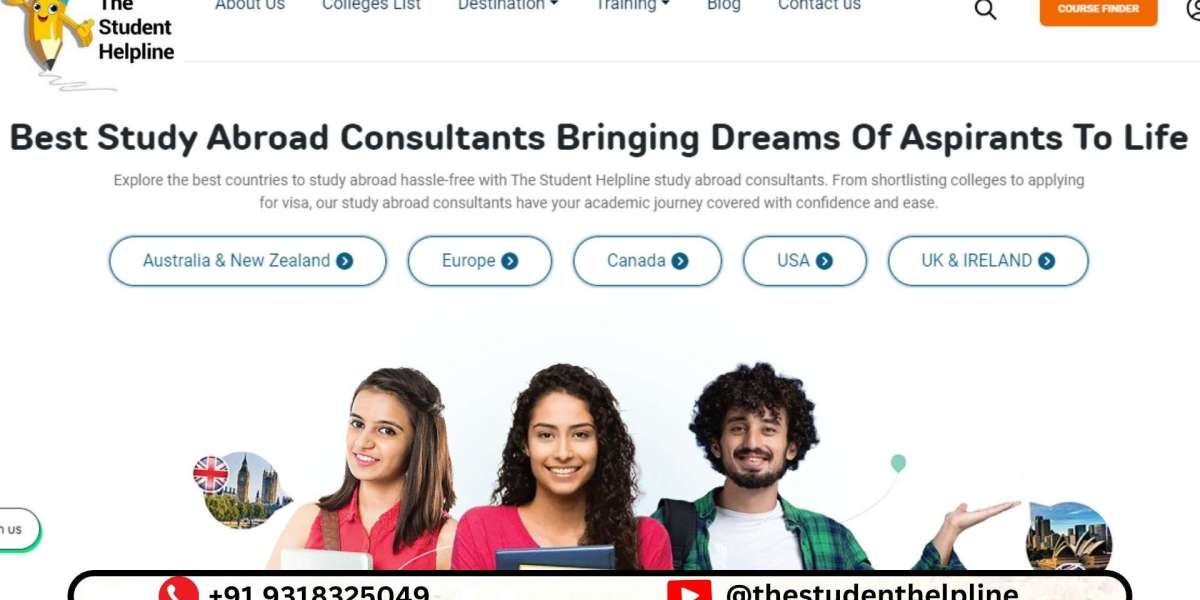Embarking on a journey to study in the UK is a dream for many students worldwide. The UK is home to some of the world's most prestigious universities and offers a rich cultural experience. However, before you can start packing your bags, it is crucial to understand the UK student visa requirements and the application process. This comprehensive guide, presented by The Student Helpline, will walk you through every step of the visa process for UK, ensuring you have all the information you need to secure your spot in a UK institution.
Understanding the UK Student Visa
What is a UK Student Visa?
A UK student visa allows international students to study in the United Kingdom for a specific period. This visa is designed for individuals who wish to pursue higher education, including undergraduate, postgraduate, or doctoral studies, at a UK-based institution.
Types of UK Student Visas
The UK offers different types of student visas, each catering to various educational levels and durations:
- Tier 4 (General) Student Visa: For students aged 16 or over who have been offered a place on a course at a UK educational institution.
- Short-term Study Visa: For students who wish to take a short course in the UK or study an English language course for up to 11 months.
- Child Student Visa: For students aged 4-17 years who want to study at an independent school in the UK.
Eligibility Criteria for a UK Student Visa
Course Requirement
To apply for a UK student visa, you must have been accepted onto a course by a licensed student sponsor. The course can be a full-time, part-time, or distance learning program, but it must meet the following criteria:
- A full-time course leading to a qualification at or above RQF level 6 (degree level) or SCQF level 9.
- A part-time course leading to a qualification at or above RQF level 7 or SCQF level 11.
- An English language course at level B2 or above.
Financial Requirements
You must demonstrate that you have enough money to support yourself and pay for your course. The amount you need depends on your circumstances:
- Tuition Fees: The amount you need to show covers the first year of tuition or the entire course if it lasts less than a year.
- Living Costs: You must show that you have at least £1,265 per month if you will be studying in London, or £1,015 per month if you will be studying outside London. These amounts are required for up to 9 months.
English Language Proficiency
You must prove your proficiency in the English language. This is usually done through an English language test, such as IELTS, TOEFL, or PTE Academic. The required score varies depending on your course and institution.
CAS (Confirmation of Acceptance for Studies)
You need a CAS to apply for a student visa. The CAS is a reference number issued by your educational institution, confirming that you have been offered a place on a course and have accepted it.
UK Student Visa Application Process
Step 1: Prepare Your Documents
Before starting your application, ensure you have the following documents:
- A valid passport or travel document.
- A CAS reference number from your educational institution.
- Proof of funds (bank statements or other financial documents).
- Proof of English language proficiency.
- Tuberculosis test results (if applicable).
- Academic certificates and transcripts.
- ATAS certificate (if your course requires one).
Step 2: Apply Online
The UK student visa application is completed online. You will need to visit the official UK government website to fill out the application form. Make sure to provide accurate and complete information to avoid any delays or rejections.
Step 3: Pay the Application Fee
The application fee varies depending on your location and the type of visa you are applying for:
- Tier 4 (General) Student Visa: £348 if applying from outside the UK, and £475 if applying from within the UK.
- Short-term Study Visa: £97 for 6 months or £186 for 11 months.
You may also need to pay the Immigration Health Surcharge (IHS) as part of your application. This gives you access to the UK's National Health Service (NHS) during your stay.
Step 4: Biometrics and Visa Appointment
After submitting your application and paying the fee, you will need to book an appointment at a visa application center to provide your biometric information (fingerprints and a photograph). During the appointment, you may also be required to submit your supporting documents.
Step 5: Wait for a Decision
The processing time for a UK student visa can vary, but you can generally expect a decision within 3 weeks if you applied from outside the UK, or 8 weeks if you applied from within the UK. You can track your application status online.
What to Do After Receiving Your Visa
Collecting Your BRP (Biometric Residence Permit)
If your visa is approved, you will receive a vignette (sticker) in your passport, allowing you to travel to the UK. Once you arrive in the UK, you must collect your BRP within 10 days of your arrival or before your vignette expires, whichever is later. The BRP serves as your official visa and contains your immigration status.
Preparing for Travel
Before traveling to the UK, ensure you have the following:
- Your passport with the visa vignette.
- Your BRP collection letter.
- Proof of funds (to show at the border, if requested).
- Your CAS letter and other supporting documents.
- Details of your accommodation in the UK.
Arriving in the UK
Upon arrival in the UK, you will go through immigration control. The immigration officer may ask to see your documents, so keep them easily accessible. Be prepared to answer questions about your course, institution, and plans in the UK.
Extending Your UK Student Visa
When to Apply for an Extension
If you need more time to complete your course or start a new course in the UK, you can apply to extend your student visa. It is recommended to apply at least 3 months before your current visa expires.
Eligibility for an Extension
To be eligible for a visa extension, you must:
- Have a valid CAS for the new course.
- Meet the financial requirements for the extension.
- Show academic progression, meaning your new course should be at a higher level than your previous course.
How to Apply for an Extension
The application process for extending your student visa is similar to the initial application. You will need to fill out an online application form, pay the application fee, and attend a biometrics appointment.
Switching to a UK Student Visa
Who Can Switch to a UK Student Visa?
If you are already in the UK on a different type of visa, you may be eligible to switch to a student visa. This option is available if you have a valid CAS and meet the other visa requirements.
Application Process for Switching
The process for switching to a student visa is similar to applying for an extension. You will need to fill out an online application form, pay the application fee, and attend a biometrics appointment.
Working While Studying in the UK
Rules and Restrictions
As an international student, you may be allowed to work part-time during your studies and full-time during holidays. The specific number of hours you can work depends on your course level and type of sponsor:
- Degree level or above: Up to 20 hours per week during term time.
- Below degree level: Up to 10 hours per week during term time.
You cannot work as a professional sportsperson, including a sports coach, or be self-employed.
Benefits of Working While Studying
Working while study in the UK can provide valuable work experience, help you develop new skills, and ease the financial burden of studying abroad. However, it is essential to balance work and study to ensure academic success.
Post-Study Work Opportunities in the UK
Graduate Route Visa
The Graduate Route visa allows international students to stay in the UK for up to 2 years after completing a degree-level course or 3 years for doctoral graduates. This visa enables graduates to work or look for work in the UK without needing a sponsor.
Applying for the Graduate Route Visa
To apply for the Graduate Route visa, you must have a valid Tier 4 or Student visa and have successfully completed your course. The application is online, and you do not need to show proof of funds or English language proficiency.
Benefits of the Graduate Route
The Graduate Route offers a fantastic opportunity to gain work experience in the UK, enhance your career prospects, and potentially transition to a different visa category, such as the Skilled Worker visa.
Common Challenges and How to Overcome Them
Delays in Visa Processing
Visa processing delays can be stressful, especially when your course start date is approaching. To avoid delays, apply for your visa as early as possible, ensure your application is complete, and have all the necessary documents ready.
Financial Challenges
Meeting the financial requirements for a UK student visa can be challenging. Consider exploring scholarships, grants, or part-time work opportunities to support your studies. The Student Helpline can assist in finding suitable funding options.
Cultural Adjustment
Moving to a new country can be overwhelming, and adjusting to a different culture takes time. Engage with student support services at your institution, connect with other international students, and participate in cultural activities to ease the transition.
Tips for a Successful UK Student Visa Application
Start Early
Begin your visa application process as soon as you receive your CAS. This will give you ample time to gather your documents, prepare for your visa appointment, and address any issues that may arise.
Double-Check Your Application
Ensure that all the information provided in your application is accurate and complete. Mistakes or omissions can lead to delays or even visa rejection.
Keep Copies of All Documents
Maintain copies of all documents submitted with your visa application. This includes your CAS, financial documents, and any correspondence with the UK Visa and Immigration (UKVI) office.
Seek Professional Guidance
If you are unsure about any aspect of the visa process, consider seeking professional guidance from experts like The Student Helpline. They can provide personalized advice and support to help you navigate the process smoothly.
Conclusion
Securing a UK student visa is a crucial step in your study abroad journey. While the process may seem daunting, proper planning and understanding of the requirements can make it manageable. The Student Helpline, the best study abroad consultants is here to guide you through every step, ensuring you have the support and information you need to fulfill your dream of studying in the UK. Remember to start your application early, gather all necessary documents, and seek expert advice if needed. With the right preparation, you'll be on your way to an enriching academic experience in one of the world's most renowned educational destinations.
FAQs
1. How long does it take to get a UK student visa?
The processing time for a UK student visa is generally 3 weeks if you apply from outside the UK and 8 weeks if you apply from within the UK. However, processing times can vary, so it's best to apply as early as possible.
2. Can I work while studying in the UK?
Yes, international students can work part-time during term time and full-time during holidays. The number of hours you can work depends on your course level and type of sponsor.
3. What happens if my visa application is refused?
If your visa application is refused, you will receive a letter explaining the reasons for the refusal. You may have the option to appeal the decision, request an administrative review, or reapply with the correct information.
4. Do I need health insurance for my UK student visa?
Yes, you must pay the Immigration Health Surcharge (IHS) as part of your visa application. This surcharge gives you access to the UK's National Health Service (NHS) during your stay.
5. Can I bring my family with me on a UK student visa?
If you are studying at the postgraduate level or higher, you may be able to bring your dependents (spouse/partner and children) with you to the UK. They will need to apply for a Dependent visa.







